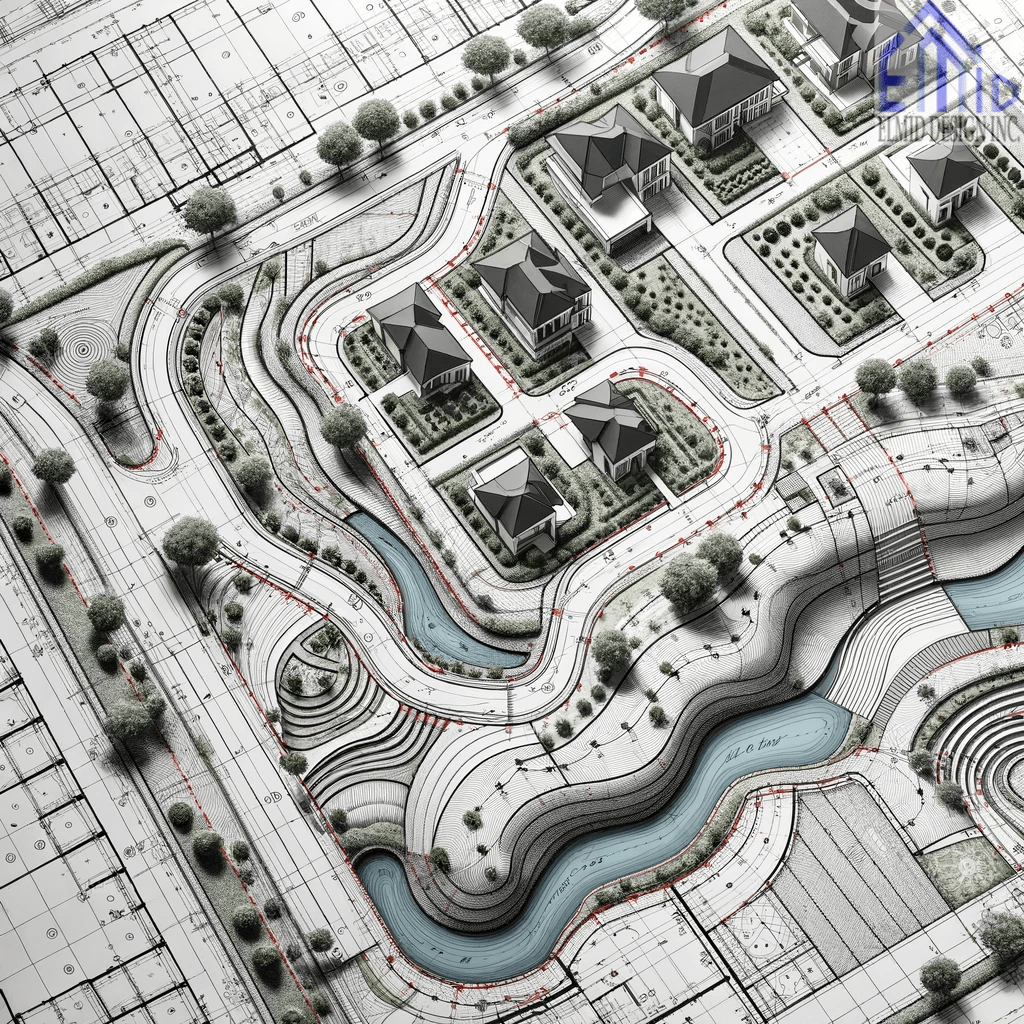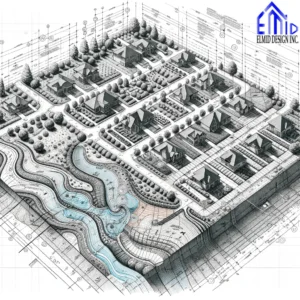Introduction
Are you feeling stressed about transforming your property in Milton? Developing a comprehensive grading plan in Milton is the key to overcoming uneven terrain and drainage problems, preventing derailment of your project goals. Don’t worry, with careful planning and the right professional guidance, you can achieve the landscape of your dreams. Let’s dive into the essential steps and considerations of creating a winning grading plan in Milton, Ontario.
In this guide, we’ll explore all things grading plan in Milton – from definitions and requirements to the nitty-gritty of how to work with professionals to see your project through to success.
What Is a Grading Plan?
Simply put, a grading plan is an engineering blueprint that maps out the existing and proposed elevations of your property. It includes detailed drawings showing the contours of the land, where slopes will be added or removed, and how excess earth will be managed. A successful grading plan achieves functionality and even curb appeal – all while meeting the Town of Milton’s standards.
Grading Plan Criteria & Grading Requirements in Milton
The Town of Milton sets specific guidelines to ensure a grading plan meets functional and aesthetic standards. Key criteria include:
- Drainage Slopes: Milton prioritizes efficient drainage and property protection. Plans must demonstrate how slopes redirect water safely to roads, existing ditches, or planned retention areas.
- Slope Stability: Engineers must consider soil characteristics and lot size to ensure that proposed slopes won’t pose risks of landslides or erosion.
- Accessibility: Grading and landscaping alterations cannot interfere with paths, doors, or accessible ramps required by codes.
- Property Boundaries: Grading plans must remain within property lines and account for any established easements.
Specific Milton Grading Requirements
To further elaborate, keep these important regulations in mind when planning your project:
- Rear Yards: Rear yards are to have a maximum grade of 5% for a minimum apron length of 5m distance from the rear face of the dwelling. This ensures water drains away from the building’s foundation, while retaining an area of gentler slope for potential patios or decks.
- Slope Limits: The maximum slope allowed on any yard surface side, front and rear shall be 3 parts horizontal to 1 part vertical (3:1). This prevents overly steep slopes, which can prove dangerous, challenging to mow, and prone to erosion.
Finding these Specifics These standards, and many additional points, are outlined in official Town of Milton documentation on site plan approval guidelines and grading policies. Working with a professional versed in these documents, like Elmid Design Inc., streamlines the planning process and increases the chance of getting your plan approved swiftly.
Why Do I Need a Grading Plan in Milton, Ontario?
- Municipal Bylaws and Requirements: Milton has specific rules and regulations for site plan applications. Your grading plan is a major component of proving that your project aligns with these requirements.
- Ensuring Proper Drainage: Water doesn’t always cooperate! A grading plan calculates slopes and channels to manage stormwater runoff, protecting your property and those around you from flooding and erosion.
- Site Stability and Foundation Protection: Slopes need to be stable. Your grading plan will consider soil types and landform features to avoid shifting ground that can be dangerous to buildings and landscaping.
Essential Components of a Milton Grading Plan
- Site Survey and Topographic Map: The first step is always understanding the lay of the land. A qualified land surveyor provides precise measurements and creates a baseline map.
- Existing and Proposed Elevations: Your grading plan shows what your site looks like now versus your intended changes, with clear markings for how high or low various sections of the land will be.
- Stormwater Management Considerations: How water will move across your site is crucial. Plans might include features like swales, drainage ditches, catch basins, and even retention ponds.
- Cut and Fill Calculations: When reshaping the land, there’s an art to minimizing waste. Grading plans detail where soil will be excavated (cut) and where it will be added (fill), saving on hauling costs.
The Process of Developing a Grading Plan in Milton
- Pre-Consultation with the Town of Milton: Your best bet is to speak with Town planning staff early, getting insights on their specific requirements based on your site and project scale.
- Involvement of Qualified Professionals: Hiring the right team is non-negotiable. Professionals like geotechnical engineers, land surveyors, and civil engineers (like those at Elmid Design Inc.) are your guide for accurate measurements and code-compliant designs.
- Site Plan Applications and Approvals: The grading plan becomes part of your official site plan application submission to the Town, along with a plethora of additional documentation. Don’t underestimate the complexity here – getting professional support eases the process significantly.
Key Considerations for Your Grading Project
- Project Budget and Timeline: Grading work adds to your overall project cost, be sure to get detailed estimates and account for delays due to weather or permits.
- Soil Types and Site Conditions: Not all soil is created equal. Sandy soil is more prone to shifting than clay. Understanding your soil matters for creating lasting slopes and stability.
- Neighboring Properties: A respectful grading plan keeps neighbors in mind. You can’t just dump water over the property line; your plan needs to ensure drainage doesn’t negatively impact surrounding land.
Elmid Design Inc: Your Expert Grading & Engineering Partner
Need help navigating the world of grading plans and site permits? Elmid Design Inc., holding a Certificate of Authorization from Professional Engineers Ontario (PEO), has the qualified team to translate your ideas into compliant and stunningly functional land design.
Conclusion
A thoughtfully created grading plan brings far more than just peace of mind with permits – it sets your entire Milton project up for success, beauty, and longevity. By investing in the right plan and professionals to make it happen, you minimize future trouble and create a property that complements your vision and functions properly for years to come.
Grading Plan FAQs
1. Who can create a grading plan for me?
Only qualified engineers and professional firms specializing in land development can create an official grading plan that meets Milton’s requirements. Companies like Elmid Design Inc. offer a full suite of services for this purpose.
2. How much does a grading plan cost?
Costs vary depending on the complexity of your site, its size, and your specific design goals. Consulting with an engineering firm early on gives you a sense of potential costs within your project budget.
3. How long does the approval process take?
Timelines fluctuate based on the current workload of Town staff and whether your initial design meets all guidelines. Leaving ample time within your project plan and working with experienced professionals familiar with Milton’s system speeds things along.
4. Can I make changes to my grading plan after construction starts?
Yes, however, revisions might necessitate new permits and additional costs. The ideal is to be as thorough as possible during the initial planning phase to avoid on-site plan changes.
Grading Plan Milton: A Comprehensive Guide
Grading plans are pivotal in shaping the land for construction and development, ensuring that projects not only meet local regulations but also adhere to environmental standards. Specifically in Milton, understanding and preparing a grading plan is essential for any construction project, ranging from residential to commercial developments. Consequently, this article delves into the intricacies of grading plans in Milton, highlighting not just their significance, but also their key components, and the critical steps involved in their preparation.
[toc]
Key Takeaways
- Grading plans detail land elevation changes, drainage patterns, and erosion control measures.
- Essential for obtaining building permits in Milton.
- Reading a grading plan requires familiarity with symbols, technical terms, and proposed changes.
- Professional guidance is advised for compliance with the Ontario Building Code and environmental regulations.
Understanding Grading Plans
A grading plan essentially maps out how land will be shaped and prepared for construction, specifically detailing elevation changes, drainage systems, and erosion control measures. Importantly, these plans are crucial for mitigating flood risks, ensuring proper water drainage, and, crucially, preserving the environmental integrity of the site.
Key Components of a Grading Plan
Grading plans in Milton encompass site information, existing topography, proposed changes, drainage systems, and erosion control measures. Furthermore, they elaborate on landscape features and utility line placements, thereby offering a comprehensive roadmap for site development.
Requirements for a Building Permit in Milton
For any construction in Milton, obtaining a grading plan is a prerequisite for securing a building permit. Consequently, these permits are essential for new buildings, renovations, and additions, featuring specific guidelines outlined for residential, as well as industrial, commercial, and institutional (ICI) projects.
Reading a Grading Plan Step-by-Step
Understanding a grading plan involves several key steps, from familiarizing oneself with the basic layout and symbols to analyzing site conditions and proposed changes. It’s crucial to understand the plan’s elevations, contour lines, and drainage systems for successful project execution.
Preparing a Grading Plan: A Guide for Civil Engineers
Civil engineers play a critical role in preparing grading plans. These plans must include detailed components such as title blocks, north arrows, scale bars, contour lines, and sections. The process involves using CAD software and considering various construction and environmental factors.
Advanced Considerations for Grading Plans
In Milton, grading plans must adhere to the Ontario Building Code, which incorporates building requirements, environmental considerations, and legal easements. Consequently, professional engineers are often required to ensure compliance with these complex regulations.
FAQs
Why is a grading plan important? A: It ensures proper land preparation, addressing drainage, erosion, and compliance with local regulations.
Can I prepare a grading plan myself? A: It’s advisable to consult with a professional engineer, especially for complex projects that must comply with the Ontario Building Code and environmental standards.
Q: How do I obtain a building permit in Milton? A: Submit a grading plan along with your building permit application, following the town’s guidelines for residential or ICI projects.
Grading plans are more than just technical documents; they are the blueprint for sustainable and compliant development. In Milton, where respecting the natural landscape and adhering to stringent building codes is paramount, these plans guide the transformation of raw land into thriving communities.

Advanced Considerations in Grading Plan Preparation
When preparing a grading plan, several advanced considerations must be meticulously taken into account to guarantee the project’s success and ensure full compliance:
Building Code Requirements and Permits
Understanding and adhering to the Ontario Building Code is paramount. Consequently, this set of regulations governs everything from minimum setbacks and permissible slope angles to specific drainage system specifications. Therefore, navigating these requirements often requires the expertise of a qualified engineer.
Setbacks and Easements
Grading plans must accurately reflect property setbacks and easements. Specifically, setbacks are necessary to ensure that structures are built a minimum distance from property lines, roads, or streams. Additionally, easements may grant others the legal right to use a portion of the property, typically for utilities or access.
Seeking Expert Guidance: The Role of Professional Engineers
Grading plans are complex and must meet strict local and provincial rules. Professional engineers are needed to manage these technical and legal details. They ensure projects are feasible and meet all standards.
Why Hire a Professional Engineer?
- Expertise in Local Regulations: Professional engineers are well-versed in the specific requirements of the Milton area and the broader Ontario regulations, ensuring that grading plans meet all necessary criteria.
- Technical Proficiency: Engineers bring a level of technical proficiency that is essential for addressing the complex interplay of grading, drainage, and structural considerations inherent in land development projects.
Conclusion
Developing and implementing a grading plan in Milton are critical steps in the land development process, necessitating a detailed understanding of local regulations, environmental considerations, and technical requirements. Consequently, by engaging with professional engineers and strictly adhering to the guidelines and regulations set forth by the Town of Milton and the Province of Ontario, developers can navigate the complexities of grading plans with greater confidence and efficiency.

Geographic Locations That We Service:
Our Licensed Professional Engineers specializing in Engineered Site Grading Plans offer the best-engineered site grading plan, lot grading and erosion plan, and drainage plan to obtain site plan approval and building permits in Ontario, including a wide range of municipalities. Each area boasts unique features and requirements, making our tailored approach essential for success.
Toronto and Surrounding Areas
In the vibrant heart of Ontario, we service Toronto (City of Toronto) and surrounding areas. Additionally, we cover Oshawa (City of Oshawa), Pickering (City of Pickering), and Clarington (Municipality of Clarington). Furthermore, our expertise extends to Ajax (Town of Ajax), Whitby (Town of Whitby), Brock (Township of Brock), Scugog (Township of Scugog), and Uxbridge (Township of Uxbridge).
Halton Region
Moving to the Halton Region, our services encompass Burlington (City of Burlington) and Halton Hills (Town of Halton Hills). Also included are Milton (Town of Milton) and Oakville (Town of Oakville).
Peel Region
In the Peel Region, we provide services in Brampton (City of Brampton), Mississauga (City of Mississauga), and Caledon (Town of Caledon).
York Region
Our services in the York Region cover Vaughan (City of Vaughan), Aurora (Town of Aurora), and East Gwillimbury (Town of East Gwillimbury). We also cater to Georgina (Town of Georgina), Markham (City of Markham), Newmarket (Town of Newmarket), Richmond Hill (City of Richmond Hill), Whitchurch-Stouffville (Town of Whitchurch-Stouffville), King (Township of King), and Bradford-West Gwillimbury (Town of Bradford-West Gwillimbury). Each municipality here offers a distinct setting, requiring our specialized approach.
Other Southern Ontario Cities and Towns
We also serve many other cities and towns in Southern Ontario. These include Hamilton (City of Hamilton), St. Catharines (City of St. Catharines), Niagara on the Lake (Town of Niagara on the Lake), Brant (County of Brant), Cambridge (City of Cambridge), Kitchener (City of Kitchener), Waterloo (City of Waterloo), and Woodstock (City of Woodstock). Furthermore, we operate in Guelph (City of Guelph), Centre Wellington (Township of Centre Wellington), Shelburne (Town of Shelburne), Orangeville (Town of Orangeville), New Tecumseth (Town of New Tecumseth), Essa (Town of Essa), Collingwood (Town of Collingwood), Wasaga Beach (Town of Wasaga Beach), Barrie (City of Barrie), Midland (Town of Midland), Orillia (City of Orillia), Ramara (Town of Ramara), Minden Hills (Town of Minden Hills), North Kawartha (Town of North Kawartha), Kawartha Lakes (City of Kawartha Lakes), Peterborough (City of Peterborough), Selwyn (Town of Selwyn), and Brighton (Municipality of Brighton).
We'd love to hear from you
Get in touch with us
Tell us about yourself by completing the form below. Your information is always kept confidential.
Reach us through
-
13025 Yonge St, Unit # 201G, Richmond Hill, ON, L4E 1A5 - +1 647 745 4507
- info@elmid.ca
Send us a Message
Elmid Design Inc.
Suite 201G,
Email: info@elmid.ca
URL: https://www.elmid.ca/
| Monday | 9:00 AM - 5:00 PM |
| Tuesday | 9:00 AM - 5:00 PM |
| Wednesday | 9:00 AM - 5:00 PM |
| Thursday | 9:00 AM - 5:00 PM |
| Friday | 9:00 AM - 5:00 PM |
| Saturday | Closed |
| Sunday | Closed |





